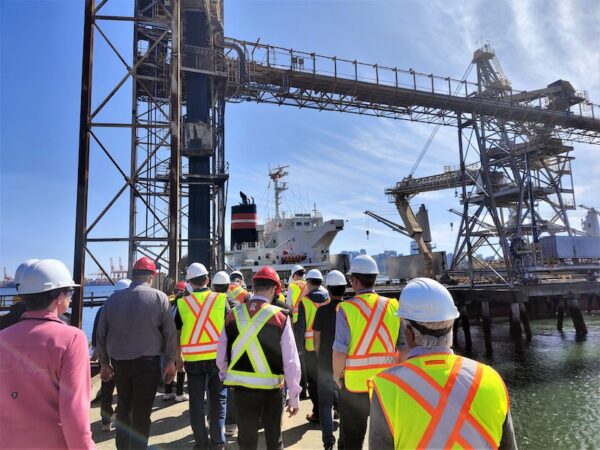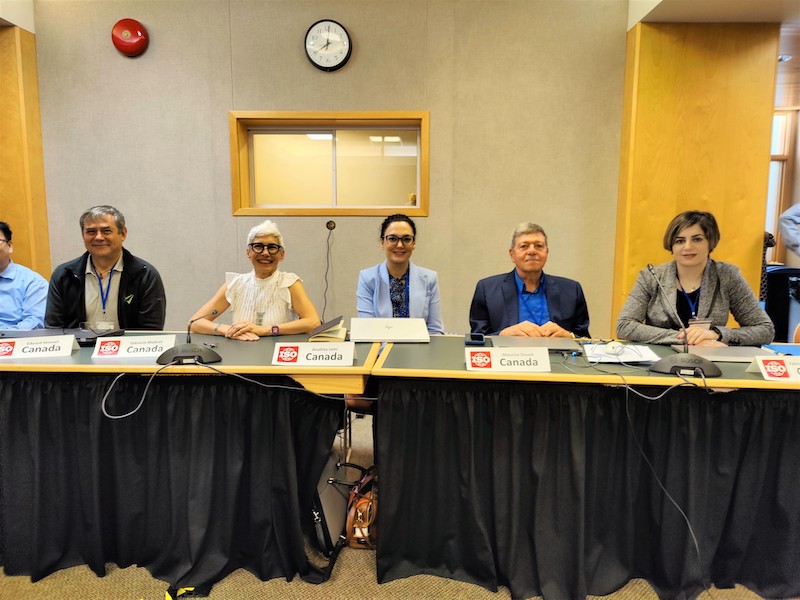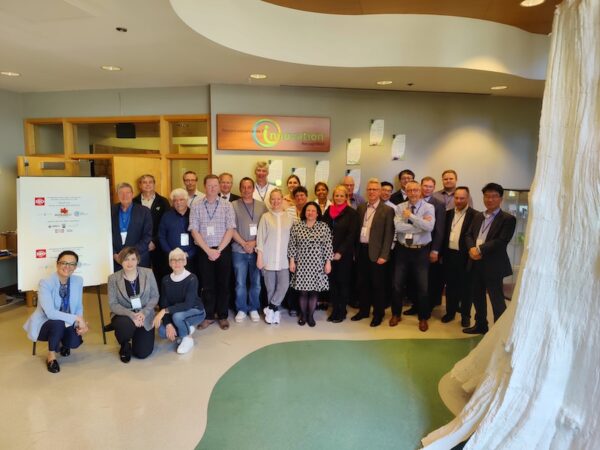
In-Depth
Canada hosts the 14th meeting of ISO/TC238 on solid biofuels
September 11, 2023
By Maurice Douek, Sebnem Madrali, Steven Law, and Fahimeh Yazdan Panah

Since the inception in 2007 of ISO Technical Committee 238 on Solid Biofuels (ISO/TC238), this is the first time that Canada was the hosting country of an ISO/TC238 meeting. The meeting was held in Vancouver from May 8- 11, 2023, and was attended by over 30 delegates from 11 countries, including Austria, Canada, Finland, Germany, Ireland, Japan, Netherlands, South Korea, Sweden, UK, and the U.S. Although most of the delegates participated in person, virtual connection was provided for the few delegates and guests who were unable to attend. Canada’s delegation consisted of Maurice Douek (head of delegation); Fahimeh Yazdan Panah (Wood Pellet Association of Canada); Sebnem Madrali (NRCanENERGY); Anahita Jami (Canadian Standards Association); and Eduard Venczel (Econotech).
All meeting facilities, technical tours, and social events were provided through the financial support and in-kind contribution from our co-hosts and sponsors: Wood Pellet Association of Canada (WPAC); Standards Council of Canada (SCC); Canadian Standards Association (CSA Group); Canfor Corporation; SGS; University of British Columbia (UBC); FPInnovations; and Fibreco Export Inc.
In addition to the working group and plenary meetings, a tour of pilot and laboratories facilities at UBC Biomass and Bioenergy Research Group (BBRG) was conducted for all delegates. A visit to Fibreco Export Inc. biomass handling terminals was also organized by the hosting committee.

Tour of Fibreco.
ISO/TC238 generally holds face-to-face meetings with all its members once a year to develop new Standards, and to revise and update existing ones, if required, to reflect current markets needs and testing practices. A plenary session takes place at the end of each meeting to discuss the progress and achievements of each working group and to plan future activities. So far, a total of 48 ISO/TC238 Standards have been published and eight are in various stages of development. Six working groups are responsible for developing and revising Standards on Terminology, Fuel Specifications and Classes, Physical and Mechanical Test Methods; Chemical Test Methods; Sampling and Sample Preparation; and Safety of Solid Biofuels.
Canada participates actively on these working groups to ensure that standards are technically sound, do not discriminate against Canadian markets, and that the Canadian solid biofuels industry is well positioned to compete effectively in the marketplace. Without such rigorous standards, production and trading of biofuels of inferior quality could create unfair competition in markets of interest to Canadian producers and increased air emissions as a result of poor combustion in boilers.
As examples, Canada recently took a leadership role by proposing modifications to graded wood chips fuel standards based on research studies conducted in Ontario with wood chip fired combustion and gasification equipment imported from Europe. The revisions were proposed to better reflect the designs of modern combustion and gasification equipment that is readily available in the marketplace and to better link the original equipment manufacturer’s fuel specification requirements with those in the standard. The proposed revisions were received well by the other members. The revised version of the standard (ISO 17225-4) has now been published.

Canada’s delegation at ISO/TC238 meeting. From (l) to (r): Eduard Venczel, Sebnem Madrali, Anahita Jami, Maurice Douek, Fahimeh Yazdan Panah.
On the national scene, federal and provincial/territorial governments are promoting replacement of fossil fuels with renewable biofuels in residential, commercial, institutional and industrial applications. In Ontario, the Atikokan Generation Station has been converted from coal to wood pellets. District heating systems have been installed in Ontario, Quebec, B.C., New Brunswick, P.E.I and the Northwest Territories. These endeavors have been driving requests for fuel specifications and quality Standards. So far, 36 out of a total of 46 ISO/TC238 Standards have been adopted as Canadian Standards. In 2017, Ontario adopted three of the ISO/TC238 Standards from the 17225 series on solid biofuel specifications and classes into its new regulations and guidelines for small wood fired combustors with a fuel input capacity of less than three megawatts (<3MW). These standards were adopted to align with the European EN 303-5 design standard for small solid biomass combustors that was also adopted by Ontario. One of the main benefits of adoption as national standards is that provincial regulators can more easily incorporate them into regulations, guidelines and/or individual site permits. This is relevant since the Canadian Council of Ministers of the Environment (CCME) published Canada-wide air emission guidelines for small solid biomass combustors for the first time in 2021 and includes references to the ISO/TC238 wood fuel standards from the 17225 series, similar to what Ontario has done. The CCME likewise adopted the European design standard EN 303-5 into its guidelines, comparable to Ontario. Provinces and territories across Canada will eventually adopt these guidelines into their own regulatory frameworks now that they are published.
Canada is currently leading a TC238 task group to develop an ISO Technical Report on Implementation of ISO standards for characterisation of wood chip fuel – Essential information for producers and users. This document aims to encourage widespread use and implementation of ISO wood chip standards globally, by assembling essential and practical information in a single document. Due to increased use of wood chips in Canada for commercial and industrial applications, the document is expected to make major stakeholders – fuel producers, fuel users, and consumers – better aware of the significance of fuel properties and specifications, and their impact on quality and operations. It is also intended to enable making more informed decisions and reduce operating and maintenance costs. The task group has attracted considerable interest from the international community, with active engagement from 16 members from eight countries in the development of this document. The report is in its final drafting stage and will be published by the end of 2023.

Delegates at ISO/TC238 meeting.
The ISO/TC238 Working Group on Safety of Solid Biofuels is developing a comprehensive series of standards. These include specifications for safe handling and storage to suppress fire and explosion and for reducing the risks of self-heating, off-gassing, and oxygen depletion in pellets plants and storage facilities. The first such standard, ISO 20023 on Safe handling and storage of wood pellets in residential and small-scale applications was published in 2018, six others were published more recently. Canada has largely contributed to these standards, particularly in the area of handling and storage for industrial applications, has led two projects on off-gassing: ISO 20048-1 on a Laboratory method for determination of off-gassing and oxygen depletion and ISO 20048-2 on Operational method for screening of carbon monoxide off-gassing (both published), and organized a round robin study. Canada has also actively participated in interlaboratory studies and development of two standards on the Determination of self-heating of pelletized biofuels, Part 1: Isothermal calorimetry and Part 2: Basket heating tests.
Canada also holds the convenorship of Working Group 4 on Physical and Mechanical Test Methods, and of Task Group 1 on Biocarbon. This Task Group was created in October 2021 following a proposal by Canada to expand the scope of ISO/TC238 to include biocarbon for metallurgical applications, in addition to heat and power applications.
The driving force for this proposal is in response to the needs of heavy industries, such as steel and cement manufacture among others, to reduce GHG emission intensity by replacing fossil carbon with biocarbon. As such, there is a demand for reliable and well-validated standard methods to assess the quality and characteristics of biocarbon in order to optimize operating conditions for various applications. In addition, internationally harmonized test methods will ensure fair trading practices and avoid confusion in the marketplace.
As a first step, the task group developed a preliminary list of over 50 properties relevant to the use of biocarbon in the metallurgical industry. For each property, parallel methods were tabulated from the coal (ISO/TC27 and ASTM 05), solid biofuels (ISO/TC238), and solid recovered materials (ISO/TC 300) industries. The intent is to assess whether existing methods for coal and solid biofuels can be adopted with little or no change, adopted with some modifications, or whether entirely new methods are required.
Following consultation between the secretariats of ISO/TC238 (solid biofuels) and ISO/TC27 (coal and coke), it was mutually agreed that ISO/TC 238 was the most appropriate Technical Committee to conduct this work. Although biocarbon – as a carbonaceous material – may be better aligned with coal, it behaves differently under coal testing conditions. This is largely due to differences in physical and chemical properties, such as different reactivity, and to the lower density of biocarbon.
At the TC238 plenary meeting on May 11, the task group was mandated to develop a roadmap for expanding the scope of ISO/TC 238 to include biocarbon for heavy industries applications. The roadmap is to include: definitions; new scope framework; and recommendations of the best process for moving forward. It is due to be completed by November 2023.
The next ISO/TC238 meeting will be hosted by ASI (Austrian Standards International) and held in Vienna, Austria, from May 13 to 17, 2024.
If anyone is interested in joining Canada’s Mirror Committee to ISO/TC238 and become a member of a TC238 Working Group or of the Task Group on biocarbon, please contact any of the following:
Maurice Douek: maurice.douek@hotmail.com
Sebnem Madrali: sebnem.madrali@NRCan-RNCan.gc.ca
Anahita Jami: anahita.jami@csagroup.org
Several ISO/TC238 Standards have been adopted by CSA as National Standards. Find more information here.
A series of technical bulletins on ISO/TC238 solid biofuels standards has also been developed by Natural Resources Canada, and provides simple, easy-to-read introduction to the CAN/ISO solid biofuels standards. Access to these bulletins is available here.
Maurice Douek is a consultant, Sebnem Madrali is with NRCan/CanmetENERGY, Steven Law is with Ontario Ministry of Environment, Conservation and Parks, and Fahimeh Yazdan Panah is with the Wood Pellet Association of Canada.
Print this page